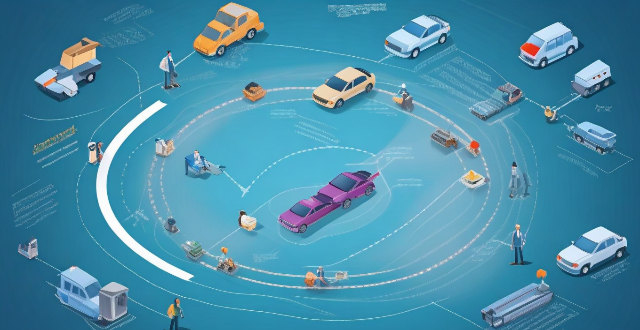The text discusses the Intelligent Transportation System (ITS) in automotive technology, explaining its key features such as traffic management, safety enhancement, efficiency optimization, environmental sustainability, connected vehicles, autonomous driving, data analytics and predictive modeling, user experience, maintenance and repair, and integration with other technologies. It also outlines the benefits of ITS including improved safety, increased efficiency, reduced environmental impact, enhanced user experience, and cost savings.

Intelligent Transportation System (ITS) in Automotive Technology
An intelligent transportation system (ITS) is a cutting-edge technology that integrates advanced communication, information, and control technologies to enhance the safety, efficiency, and sustainability of surface transportation systems. In the context of automotive technology, ITS plays a crucial role in improving traffic management, reducing congestion, and minimizing the environmental impact of vehicles.
Key Features of ITS in Automotive Technology
1. Traffic Management: ITS enables real-time monitoring and management of traffic flow, reducing congestion and improving overall road usage. This includes dynamic route planning, adaptive traffic signal control, and incident detection systems.
2. Safety Enhancement: By integrating sensors, cameras, and other detection devices into vehicles and infrastructure, ITS helps prevent accidents and improve driver awareness. Examples include collision avoidance systems, automatic emergency braking, and lane departure warnings.
3. Efficiency Optimization: ITS optimizes the performance of transportation networks by providing accurate travel time predictions, reducing fuel consumption, and improving public transit services. This leads to reduced travel times, lower operating costs, and increased user satisfaction.
4. Environmental Sustainability: ITS promotes eco-friendly driving habits by encouraging the use of electric vehicles, implementing smart parking solutions, and reducing emissions through efficient traffic management.
5. Connected Vehicles: ITS facilitates vehicle-to-vehicle (V2V) and vehicle-to-infrastructure (V2I) communication, allowing for seamless data exchange between vehicles and roadside units. This enhances situational awareness and enables coordinated actions among vehicles on the road.
6. Autonomous Driving: ITS lays the foundation for autonomous vehicles by providing reliable communication channels, precise mapping data, and advanced control algorithms. This paves the way for self-driving cars that can operate safely and efficiently in complex urban environments.
7. Data Analytics and Predictive Modeling: ITS utilizes big data analytics to predict future traffic patterns, identify potential bottlenecks, and develop strategies for long-term transportation planning. This helps cities make informed decisions about infrastructure investments and policy changes.
8. User Experience: ITS focuses on improving the overall user experience by providing personalized services such as real-time transit information, mobile ticketing, and ridesharing options. This encourages more people to use public transportation and reduces reliance on private vehicles.
9. Maintenance and Repair: ITS employs predictive maintenance techniques to monitor the condition of roads, bridges, and other infrastructure elements. This allows for proactive repairs before major damage occurs, extending the lifespan of transportation assets.
10. Integration with Other Technologies: ITS works in conjunction with other emerging technologies like blockchain, artificial intelligence (AI), and the Internet of Things (IoT) to create a more interconnected and intelligent transportation ecosystem.
Benefits of ITS in Automotive Technology
- Improved Safety: By reducing the likelihood of accidents and enhancing driver awareness, ITS contributes to safer roads for all users.
- Increased Efficiency: Optimal traffic flow and reduced congestion lead to shorter travel times and lower fuel consumption.
- Reduced Environmental Impact: Promoting eco-friendly practices through efficient traffic management and support for electric vehicles helps mitigate climate change effects.
- Enhanced User Experience: Personalized services and convenient transportation options make commuting more enjoyable and accessible for everyone.
- Cost Savings: Predictive maintenance and optimized resource allocation result in significant cost savings for both individuals and governments.
In conclusion, an intelligent transportation system (ITS) is a game-changing technology that revolutionizes the way we move within our cities. By leveraging cutting-edge advancements in communication, information processing, and control mechanisms, ITS aims to create a safer, more efficient, and sustainable transportation network that benefits both drivers and pedestrians alike. As automotive technology continues to evolve at a rapid pace, ITS will undoubtedly play an increasingly vital role in shaping the future of transportation.